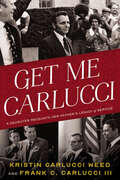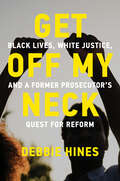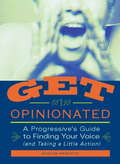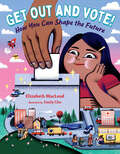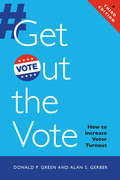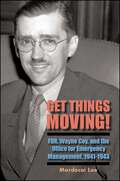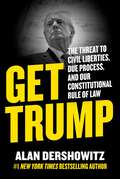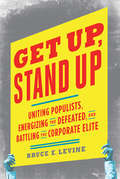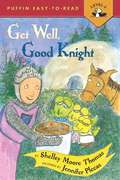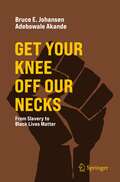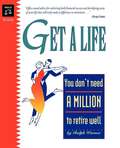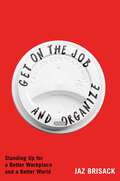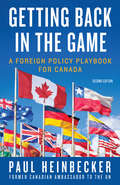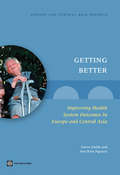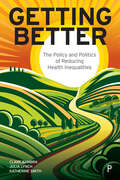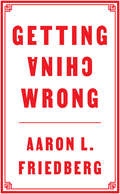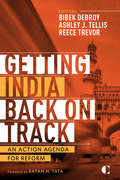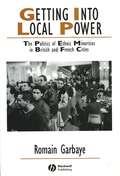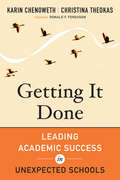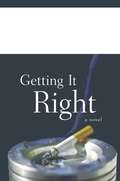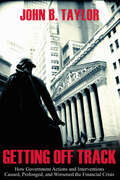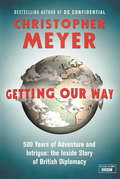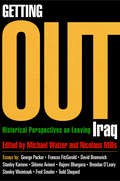- Table View
- List View
Get Me Carlucci: A Daughter Recounts Her Father's Legacy of Service
by Kristin Carlucci Weed Frank Carlucci"Frank Carlucci is living proof to all of us and to the world that 'only in America' is more than just an easy clichÉ: it's a great ringing truth." —President Ronald Reagan Once called "Washington's ultimate survivor" by The Washington Post, Frank C. Carlucci III served six presidents, traveled the world on behalf of his country, and ultimately rose to prominence as Secretary of Defense. Through every chapter of his extraordinary and varied career, American leaders had a common refrain: "Get Me Carlucci!" Get Me Carlucci combines Carlucci's own words with interviews from his contemporaries and context from his daughter, Kristin Carlucci Weed, who completes her late father's story while keeping his "characteristic deadpan humor and tell-it-like-it-is sensibility, no frills and no fuss." While Carlucci did not seek the spotlight, his work shaped the world. As a young Foreign Service Officer, he weathered the turmoil and excitement of the Congo Crisis of the 1960s, and as Ambassador to Portugal in the 1970s, he played a crucial role in the country's transition to democracy. With a dynamic mind and a knack for building relationships, Carlucci then returned to the U.S. to serve in Washington. As Deputy Director of the CIA, National Security Advisor, and eventually Secretary of Defense under President Ronald Regan, he defined American Cold War policy. Starting with Carlucci's childhood and early military days, Get Me Carlucci is a unique look at the wide-ranging career of one of the twentieth century's most important behind-the-scenes actors. "The President thought the world of him," said Carlucci's friend and mentee Colin Powell. "I thought the world of him." Carlucci's story is one of service, hard work, and true statesmanship as the grandson of an Italian stonecutter becomes an indispensable voice at the highest levels of American government.
Get Off My Neck: Black Lives, White Justice, and a Former Prosecutor's Quest for Reform
by Debbie HinesA deeply revealing exposé of the American prosecutorial system and its historic and present racial inequities—and how we can transform the system to one of fairness and justice.In Get Off My Neck, Debbie Hines draws on her unique perspective as a trial lawyer, former Baltimore prosecutor, and assistant attorney general for the State of Maryland to argue that US prosecutors, as the most powerful players in the criminal justice system, systematically target and criminalize Black people. Hines describes her disillusionment as a young Black woman who initially entered the profession with the goal of helping victims of crimes, only to discover herself aiding and abetting a system that prizes plea bargaining, speedy conviction, and excessive punishment above all else. In this book, she offers concrete, specific, and hopeful solutions for just how we can come together in a common purpose for criminal justice and racial justice reform.Get Off My Neck explains that the racial inequities in the prosecutorial system are built into our country&’s DNA. What&’s more, they are the direct result of a history that has conditioned Americans to perceive the Black body as insignificant at best and dangerous at worst. Unlike other books that discuss the prosecutor&’s office and change from inside the office, Hines offers a proactive approach to fixing our broken prosecutorial system through a broad-based alliance of reform-minded prosecutors, activists, allies, communities, and racial justice organizations—all working together to end the racist treatment of Black people.Told intimately through personal, family, and client narratives, Get Off My Neck is not only a deeply sobering account of our criminal justice system and its devastating impact on Black children, youth, and adults but also a practical and inspiring roadmap for how we can start doing better right now.
Get Opinionated: A Progressive's Guide to Finding Your Voice (and Taking a Little Action)
by Amanda MarcotteFor those who like their politics blunt, raw, and uncompromising comes Get Opinionated-a guide to the issues you care about: environmentalism, reproductive rights and access, taxes and public wealth, GLBTQ rights, health care, the War on Terror, the War on Drugs, and the Culture Wars.Get Opinionated will help you find your political voice and galvanize you into action-or at least help you understand which issues you care about (or which ones most piss you off)-and why.
Get Out and Vote!: How You Can Shape the Future (Orca Think #8)
by Elizabeth MacLeodExplore the past, present and future of voting around the world, and why it's one of the most important things we can do as citizens. In Get Out and Vote!, discover how voting affects everyone's life, what election day looks like, why some people don’t cast a ballot and more. Did you know a ping-pong ball once decided an election or that the government in Ancient Greece voted by shouting? From elections and politics to voter suppression and accessible ballots, there is so much to explore when it comes to voting. With profiles of young people who are making the vote count, this book will empower young people of all backgrounds to make their voices heard.
Get Out the Vote: How to Increase Voter Turnout
by Donald P. Green Alan S. GerberThe most important element in every election is getting voters to the polls-these get-out-the-vote (GOTV) efforts make the difference between winning and losing office. With the first two editions of Get Out the Vote, Donald P. Green and Alan S. Gerber broke ground by introducing a new scientific approach to the challenge of voter mobilization that profoundly influenced how campaigns operate. Get Out the Vote has become the reference text for those who manage campaigns and study voter mobilization.In this expanded and updated edition, Green and Gerber incorporate data from more than 100 new studies, which shed new light on the costeffectiveness and efficiency of various campaign tactics, including door-to-door canvassing, email, direct mail, and telephone calls. Two new chapters focus on the effectiveness of registration drives and messaging tactics. The new Get Out the Vote will be available as the country gears up for the 2016 presidential campaign. This readable, practical guide on voter mobilization is sure to be an important resource for consultants, candidates, and grassroots organizations, as well as a valuable teaching tool in courses on campaigns and elections.
Get Things Moving!: FDR, Wayne Coy, and the Office for Emergency Management, 1941-1943
by Mordecai LeeShortly after Hitler's armies invaded Western Europe in May of 1940, President Franklin Roosevelt activated a new agency within the Executive Office of the President called the Office for Emergency Management (OEM). The OEM went on to house many prewar and wartime agencies created to manage the country's arms production buildup and economic mobilization. After World War II a consensus by historians quickly gelled that OEM was unimportant, viewing it as a mere administrative holding company and legalistic convenience for the emergency agencies. Similarly they have dismissed the importance of the Liaison Officer for Emergency Management (LOEM), viewing the position as merely a liaison channel between OEM agencies and the White House. Mordecai Lee presents a revisionist history of OEM, focusing mostly on the record of the longest serving LOEM, Wayne Coy. Drawing upon largely unexamined archival sources, including the Roosevelt and Truman Presidential Libraries and the National Archives, Lee gives a precise account of what Coy actually did and, contrary to the conventional wisdom, concludes he was an important senior leader in the Roosevelt White House, engaging in management, policy, and politics.
Get Trump: The Threat to Civil Liberties, Due Process, and Our Constitutional Rule of Law
by Alan DershowitzIn Get Trump: The Threat to Civil Liberties, Due Process, and Our Constitutional Rule of Law, Alan Dershowitz—#1 New York Times bestselling author and one of America&’s most respected legal scholars—analyses the unremitting efforts by political opponents of Donald Trump to &“get&” him—to stop him from running in 2024—at any cost. Alan Dershowitz has been called &“one of the most prominent and consistent defenders of civil liberties in America&” by Politico and &“the nation&’s most peripatetic civil liberties lawyer and one of its most distinguished defenders of individual rights&” by Newsweek. Get Trump makes clear that unconstitutional efforts to stop Trump from retaking the presidency challenge the very foundations of our liberty: due process, right to counsel, and free speech. Those who justify these dangerous departures from the rule of law argue that the threat posed by a second Trump presidency is &“different&” and &“immediate,&” while the departures from constitutional norms are longer term and more abstract. Dershowitz explains that defenders of Trump&’s constitutional rights—even those like him who strongly oppose Trump politically—are sought to be silenced; their free speech rights attacked, their integrity questioned, and their careers threatened. Much of the media substitutes advocacy against Trump for objective reporting, while many in academia petition and propagandize against rights they previously valued—all in the interest of getting Trump. The essence of justice is that it must be equally applicable to all, Dershowitz notes. No one is above the law but digging to find crimes in order to influence an election does not constitute the equal application of the law. In order to assure equal application in comparable situations, he proposes two criteria for indicting a likely candidate of the opposing party: the Richard Nixon standard and the Hillary Clinton standard—and most recently, the Joe Biden standard. Get Trump warns that regardless of whether this anti-democratic effort to stop Trump from running succeeds or fails, it is likely to create dangerous precedents that will lie around like loaded weapons ready to be deployed against other controversial candidates, officials, or citizens about whom it can be argued that the danger they pose &“is different.&”
Get Up, Stand Up: Uniting Populists, Energizing the Defeated, and Battling the Corporate Elite
by Bruce E. Levine"Are Americans a Broken People?" Levine, a practicing clinical psychologist and frequent writer on political matters, asked in a 2009 web article, meditating on the problem of American political passivity in the face of attacks on their liberties and their economic well-being. In this work, he expands on that article, exploring the cultural and psychological reasons many Americans feel politically demoralized and considering the means of regaining the individual self-respect and collective self-confidence that are prerequisites for building mass democratic politics (based on a populism transcending right/left divisions) that can overcome the current control of the American political system by elites. Annotation ©2011 Book News, Inc. , Portland, OR (booknews. com)
Get Well, Good Knight
by Shelley Moore ThomasThe much-heralded Good Knight is back--only this time his three little dragon friends are sick in bed. Their scaly foreheads are hot and their noses are drip-drip-dripping. They feel awful. The Good Knight comes to the rescue again! He brings them some slimy, grimy soup from the wizard to make them feel better. But the dragons wont touch it. What is a Good Knight to do?
Get Your Knee Off Our Necks: From Slavery to Black Lives Matter
by Bruce E. Johansen Adebowale AkandeThe death of George Floyd on May 25, 2020, and the ensuing trial of Derek Chauvin for murder a year later has rubbed raw the bloodiest stain on the United States’ history and its world reputation. The nine minutes and 29 seconds during which Chauvin’s knee crushed the spark of life out of Floyd was not unusual in the history of the United States. Before the U.S. Civil War, slaves were routinely beaten to death for disobeying orders or running away, then often lynched. In roughly two centuries, Blacks have achieved nominal freedom. But, as this book’s opening chapter and expert essays that follow indicate, freedom has been conditional based on inequity of wealth, social, and legal discrimination. None of this is new in the United States; what is new is the number of people rising up in protest, a figure in the millions around the world after Floyd’s murder.This book supplies a readable, scholarly account of recent issues in race and racism in the United States that will be useful for general readers, undergraduate students, and their professors. It will be useful in many fields, including Black studies, other ethnic pursuits, United States history, law, criminal justice, intercultural communication, et al. The work contains a powerful historical narrative followed by several important, essays on subjects including George Floyd’s murder, the rise of the Black Lives Matter movement and many other victims of systematic racism.
Get a Life: You Don't Need a Million to Retire Well (5th edition)
by Ralph WarnerWarner founded Nolo Press in 1971, built the company and authored or co-authored many of its books, and happily retired. This updated edition of his compendium of advice, interviews, and exemplar cases includes coverage of finances, lifestyle choices, and coping strategies as well as new health research and information about how to prepare for retirement while still in midlife. Annotation ©2004 Book News, Inc., Portland, OR (booknews.com)
Get on the Job and Organize: Standing Up for a Better Workplace and a Better World
by Jaz BrisackFor fans of Fight Like Hell and A History of America in Ten Strikes, the leader of the Starbucks and Tesla union movements shares stories from the front lines to help us organize our own workplaces.Get on the Job and Organize is a compelling, inspirational narrative of the Starbucks and Tesla unionization efforts, telling the broader story of the new, nationwide labor movement unfolding in our era of political and social unrest. As one of the exciting new faces of the American Labor Movement, Jaz Brisack argues that while workers often organize when their place of work is toxic, it&’s equally important to organize when you love your job. With an accessible voice and profound insight, Brisack puts everything into the context of America&’s long tradition of labor organizing and shows us how we too can organize our workplaces, from how to educate yourself and your colleagues, to what backlash can be expected and how to fight it, to what victory looks like even if the union doesn&’t necessarily &“win.&”
Getting Back in the Game: A Foreign Policy Handbook for Canada
by Paul HeinbeckerPaul Heinbecker has a compelling vision for the future of Canadian foreign policy and argues that Canada still has a role to play in the rehabilitation of global governance. Has Canada lost its place in the world? Are we destined for a future as a middle power, denied a seat at the "grown-ups table"? Some would argue yes, that decades of neglect and inattention have rendered Canadian foreign policy ineffective at best and non-existent at worst. Paul Heinbecker disagrees. The golden days of Lester B. Pearson may be long gone, he contends (and perhaps they weren’t quite as "golden" as we’d all like to remember), but Canada still has a part to play. In Getting Back in the Game, Heinbecker presents his compelling vision for the future of Canadian foreign policy, a future in which Canada can work both with the United Nations and apart from it; in which our government can take a stand and effect change on issues of the day from climate change to the Middle East; in which this country has a key role to play in the rehabilitation of global governance.
Getting Better
by Son Nam Nguyen Owen SmithFifty years ago, health outcomes in the countries of Eastern Europe and Central Asia were not far behind those in Western Europe and well ahead of most other regions of the world. But progress since then has been slow. While life expectancy in the ECA region today is close to the global average, the gap with its western neighbors has doubled, and other middle-income regions have all surpassed ECA. Some countries in the region are doing better, but full convergence with the world's most advanced health systems is still a long way off. At the same time, survey evidence suggests that the health sector is the top priority for additional investment among populations across the region. The experience of high-income countries also suggests that popular demand for strong and accessible health systems will only grow over time. Yet these aspirations must be reconciled with current fiscal realities. In brief, health sector issues are a challenge here to stay for policy-makers across the ECA region. This report draws on new evidence to explore the development challenge facing health sectors in ECA, and highlights three key agendas to help policy-makers seeking to achieve more rapid convergence with the world's best performing health systems. The first is the health agenda, where the task is to strengthen public health and primary care interventions to help launch the "cardiovascular revolution" that has taken place in the West in recent decades. The second is the financing agenda, in which growing demand for medical care must be satisfied without imposing undue burden on households or government budgets. The third agenda relates to broader institutional arrangements. Here there are some key reform ingredients common to most advanced health systems that are still missing in many ECA countries. A common theme in each of these three agendas is the emphasis on improving outcomes, or "Getting Better".
Getting Better: The Policy and Politics of Reducing Health Inequalities
by Clare Bambra Julia Lynch Katherine E. SmithAvailable open access digitally under CC-BY-NC-ND licence. Health inequality has reached a crisis point. Your income or hometown can have a devastating impact on how well and how long you live. This injustice, exacerbated during the COVID-19 pandemic, continues as the cost of living rises and other sources of inequity grow. What can be done to make things better? This book, written by the authors behind the award-winning The Unequal Pandemic, explores successful international case studies of governments reducing health inequalities – from the USA and Brazil to Germany and England – stretching over fifty years from the 1960s to the 2000s. Essential reading for students and scholars of public health and the social sciences, and for health and social care professionals and policy makers, this book demonstrates that reducing health inequalities is possible and provides a roadmap for today’s governments to follow.
Getting China Wrong
by Aaron L. FriedbergThe West’s strategy of engagement with China has failed. More than three decades of trade and investment with the advanced democracies have left that country far richer and stronger than it would otherwise have been. But growth and development have not caused China’s rulers to relax their grip on political power, abandon their mercantilist economic policies, or accept the rules and norms of the existing international system. To the contrary: China today is more repressive at home, more aggressive abroad, and more obviously intent on establishing itself as the world’s preponderant power than at any time since the death of Chairman Mao. What went wrong? Put simply, the democracies underestimated the resilience, resourcefulness, and ruthlessness of the Chinese Communist Party. For far too long, the United States and its allies failed to take seriously the Party’s unwavering determination to crush opposition, build national power, and fulfill its ideological and geopolitical ambitions. In this timely and powerfully argued study, Aaron Friedberg identifies the assumptions underpinning engagement, describes the counterstrategy that China’s Communist Party rulers devised in order to exploit the West’s openness while defeating its plans, and explains what the democracies must do now if they wish to preserve their prosperity, protect their security, and defend their common values.
Getting India Back on Track
by Ashley J. Tellis Reece Trevor Bibek DebroyIndia has fallen far and fast from the runaway growth rates it enjoyed in the first decade of the twenty-first century. In order to reverse this trend, New Delhi must seriously reflect on its policy choices across a wide range of issue areas. Getting India Back on Track broadly coincides with the 2014 Indian elections to spur a public debate about the program that the next government should pursue in order to return the country to a path of high growth. It convenes some of India's most accomplished analysts to recommend policies in every major sector of the Indian economy. Taken together, these seventeen focused and concise memoranda offer policymakers and the general public alike a clear blueprint for India's future.ContentsForewordRatan N. Tata (Chairman, Tata Trusts)IntroductionAshley J. Tellis and Reece Trevor (Carnegie Endowment for International Peace)1. Maintaining Macroeconomic StabilityIla Patnaik (National Institute of Public Finance and Policy)2. Dismantling the Welfare StateSurjit Bhalla (Oxus Investments)3. Revamping Agriculture and the Public Distribution SystemAshok Gulati (Commission for Agriculture Costs and Prices)4. Revisiting Manufacturing PolicyRajiv Kumar (Centre for Policy Research)5. Generating EmploymentOmkar Goswami (Corporate and Economic Research Group)6. Expanding Education and SkillsLaveesh Bhandari (Indicus Analytics)7. Confronting Health ChallengesA. K. Shiva Kumar (National Advisory Council)8. Accelerating Infrastructure ModernizationRajiv Lall and Ritu Anand (IDFC Limited)9. Managing UrbanizationSomik Lall and Tara Vishwanath (World Bank)10. Renovating Land ManagementBarun S. Mitra (Liberty Institute) and Madhumita D. Mitra (consultant)11. Addressing Water ManagementTushaar Shah (International Water Management Institute) and Shilp Verma (independent researcher)12. Reforming Energy Policy and PricingSunjoy Joshi (Observer Research Foundation)13. Managing the EnvironmentLigia Noronha (Energy and Resources Institute)14. Strengthening Rule of LawDevesh Kapur (University of Pennsylvania) and Milan Vaishnav (Carnegie Endowment for International Peace)15. Correcting the Administrative DeficitBibek Debroy (Centre for Policy Research)16. Building Advanced Technology Capacity for Competitive Arms AcquisitionRavinder Pal Singh (Stockholm International Peace Research Institute)17. Rejuvenating Foreign PolicyC. Raja Mohan (Observer Research Foundation and Carnegie Endowment for International Peace
Getting Into Local Power: The Politics of Ethnic Minorities in British and French Cities (IJURR Studies in Urban and Social Change Book Series #62)
by Romain GarbayeThis book presents a comparison of the patterns of ethnic minority politics in British and French city politics. A comparison of the participation of ethnic minorities in British and French cities Includes direct comparisons of particular cities Birmingham, Lille and Roubaix Shows how ethnic and cultural diversity translates into political conflict in different political systems Considers styles of political mobilisation of ethnic minorities in the context of urban political systems, as well as the strategies used by party leaders and to manage ethnic diversity in political competition Analyses how ethnic and cultural diversity in urban societies translates into conflictual politics Enhances our understanding of local politics and of the evolution of political representation in industrialised democracies
Getting It Done: Leading Academic Success in Unexpected Schools
by Karin Chenoweth Ronald F Ferguson Christina Theokas"Getting It Done describes in clear and helpful detail what leaders of successful high-poverty and high-minority schools have done to promote and sustain student achievement. It follows two celebrated books by Karin Chenoweth: "It's Being Done," which established that the work of educating all children is possible, and How It's Being Done, which examined the structures and processes necessary to support academic success. Getting It Done turns to the crucial issue of school leadership, exploring how school leaders have promoted unprecedented levels of school and student achievement. A book that focuses on real leaders--and on the knowledge and skills that they have employed on behalf of heightened achievement--Getting It Done will be essential reading for school leaders, and for all who believe that a successful education can be attained by all students."
Getting It Done: Leading Academic Success in Unexpected Schools
by Karin Chenoweth Christina Theokas"Getting It Done describes in clear and helpful detail what leaders of successful high-poverty and high-minority schools have done to promote and sustain student achievement. It follows two celebrated books by Karin Chenoweth: &“It&’s Being Done,&” which established that the work of educating all children is possible, and How It&’s Being Done, which examined the structures and processes necessary to support academic success. Getting It Done turns to the crucial issue of school leadership, exploring how school leaders have promoted unprecedented levels of school and student achievement. A book that focuses on real leaders—and on the knowledge and skills that they have employed on behalf of heightened achievement—Getting It Done will be essential reading for school leaders, and for all who believe that a successful education can be attained by all students."
Getting It Right: A Novel
by William F. Buckley Jr.This book is a sweeping tale that takes us from the Hungarian uprising of 1956, Cold War espionage, and tempestuous romance, to political skulduggery in 1960's America.
Getting Off Track: How Government Actions and Interventions Caused, Prolonged, and Worsened the Financial Crisis
by John B. TaylorIn this concise volume, leading economist John B. Taylor offers empirical research to explain what caused the current financial crisis, what prolonged it, and what dramatically worsened it more than a year after it began. The evidence he presents strongly suggests that specific government actions and interventions are largely to blame and that any future government interventions must be based on a clearly stated diagnosis of the problem and a rationale for the interventions.
Getting Our Way: 500 Years of Adventure and Intrigue: the Inside Story of British Diplomacy
by Christopher MeyerOver the last five hundred years, Britain's power has waxed and waned: from the puny island nation of the sixteenth century, to the global superpower of the nineteenth century, to the more modest post-imperial status today of a major European power. But in these radically different circumstances, the wisdom of Lord Palmerston's observation has endured.Getting Our Way recounts nine stories from Britain's diplomatic annals over the last five hundred years, in which the diplomats themselves are at the centre of the narrative. It is an inside account of their extraordinary experiences, sometimes in the face of physical danger, often at history's hinge. Be it Henry Killigrew's mission to Edinburgh in 1572, Castlereagh at the Congress of Vienna, Our Man in Washington and the Nassau Deal, or the handover of Hong Kong to China, we can see how Britain has viewed its interests in the world and sought to advance them.Some of these dramatic episodes record triumph, some failure, but all of them illustrate how the three pillars of the national interest - security, prosperity and values - have been the foundation of British foreign policy for half a century. Each story is illuminated by colourful anecdotes and insights drawn from Christopher Meyer's first-hand experience of international relations.Moreover, the book is a salutary reminder that foreign policy (what is to be done) and diplomacy (how it is to be done) begin and end with the national interest. And far from being the preserve of aloof aristocrats, the pursuit of our national interest is replete with intrigue, treachery, espionage, and danger - an extraordinary combination of high principle and low cunning, vice and virtue, all with the specific aim of 'getting our way'.
Getting Our Way: 500 Years of Adventure and Intrigue: the Inside Story of British Diplomacy
by Sir Christopher MeyerA highly informed insider's account of some of the 'honest men' as they sought, by fair means or foul, to get Britain its way in the world.GETTING OUR WAY recounts nine stories from Britain's diplomatic annals over the last five hundred years, in which the diplomats themselves are at the centre of the narrative. It is an inside account of their extraordinary experiences, sometimes in the face of physical danger, often at history's hinge. Be it Henry Killigrew's mission to Edinburgh in 1572, Castlereagh at the Congress of Vienna, Our Man in Washington and the Nassau Deal, or the handover of Hong Kong to China, we can see how Britain has viewed its interests in the world and sought to advance them. Some of these dramatic episodes record triumph, some failure, but all of them illustrate how the three pillars of the national interest - security, prosperity and values - have been the foundation of British foreign policy for half a century. Each story is illuminated by colourful anecdotes and insights drawn from Christopher Meyer's first-hand experience of international relations. Moreover, the book is a salutary reminder that foreign policy and diplomacy begin and end with the national interest. And far from being the preserve of aloof aristocrats, the pursuit of our national interest is replete with an extraordinary combination of high principle and low cunning, vice and virtue, all with the specific aim of 'getting our way'.
Getting Out
by Nicolaus Mills Michael WalzerEventually every conqueror, every imperial power, every occupying army gets out. Why do they decide to leave? And how do political and military leaders manage withdrawal? Do they take with them those who might be at risk if left behind? What are the immediate consequences of departure? For Michael Walzer and Nicolaus Mills, now is the time to ask those questions about exiting--and to worry specifically about the difficulties certain to arise as we leave--Iraq.Getting Out approaches these issues in two sections. The first, entitled "Lessons Learned," examines seven historical cases of how and how not to withdraw: Britain's departure from the American colonies and from India, the French withdrawal from Algeria, Israel's unilateral withdrawal from Gaza, and the U.S. decision to leave (or not leave) the Philippines, Korea, and Vietnam. These cases offer a comparative perspective and an opportunity to learn from the history of political and military retreats.The second section, "Exiting Iraq," begins with an introduction to just how the United States got into Iraq and continues with an examination of how the U.S. might leave from a diversity of voices, ranging from those who believe that the Iraq war has produced no real good to those who hope for a decent ending. In addition to essays by volume editors Walzer and Mills, Getting Out features contributions by Shlomo Avineri, Rajeev Bhargava, David Bromwich, Frances FitzGerald, Stanley Karnow, Brendan O'Leary, George Packer, Todd Shepard, Fred Smoler, and Stanley Weintraub.
